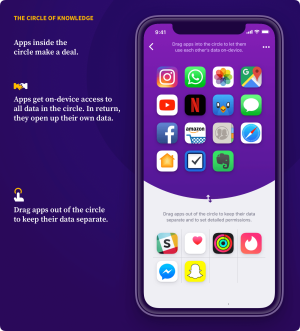Cloudfall
Rethinking how technology uses our personal data
Lennart ZiburskiSummary
This idea argues that the current tech ecosystem splits our data across platforms, making it impossible for any system — especially AI — to genuinely understand or support us as individuals. Our messages, photos, and documents are scattered across dozens of services, none of which see the whole picture. Worse, these systems aren't built to help us — they're built to extract engagement and profit.
In contrast, Ziburski proposes a world where data stays on-device, under user control. AI doesn’t need a cloud to be powerful — it needs context and trust. By putting computation where the user is, we not only gain privacy but open the door to AI that’s actually aligned with our values, not someone else’s business model.
The Cloudfall is ultimately a call to action. It urges designers, developers, and users to rethink our assumptions about data and intelligence, and to build systems that restore human agency, enable real personalization, and protect the foundations of democracy and freedom in the digital age.
I believe that users having control over their data will let companies achieve the full potential of AI. By designing technology to align with user values, we can reignite our confidence in technology that amplifies and advances humanity. Lennart Ziburski
Key concepts
- The cloud cripples your data Today’s AI needs unified access to your data — but the cloud keeps everything scattered and siloed. By moving intelligence on-device, you stay in control while enabling smarter, more personalized systems.
- The circle of knowledge Apps share a common space and speak a common language. Instead of sandboxed silos, they use open data types and can access each other’s information — if they contribute. It’s a collaborative, on-device ecosystem powered by federated learning.
- Data permits Data should be treated like money: stored securely, and only spent with intention. Cloud providers become encrypted storage lockers, not overlords. Detailed data permits let users see exactly what’s at stake — transparency as a trust-building feature.
- Profile: a map of you A dynamic, system-wide profile tracks your habits, interests, and values. It gives apps context — what you’re into, what you’re doing — without sacrificing control. Apps gain context, not control, and the system becomes truly personal.
- Contextual transparency Transparency is most useful in context. AI should be accountable — offering clear, timely explanations through voice or inline feedback, right when decisions are made.
The Cloudfall challenges our default assumptions about AI and data. Instead of surrendering control to the cloud, it proposes a world where intelligence is local, collaboration is open, and the user — not the platform — is at the center.

This idea was originally published by Lennart Ziburski as The Cloudfall: Rethinking how technology uses our personal data.
Big Idea Initiative is all about making connections, and sharing knowledge, thoughts, and ideas that support deep thinking and collaboration. Our goal is to create a space that sparks thinking and conversations among people whose ideas might benefit each other, even if they’re working on completely unrelated topics. We think that pushing back the limits of possibility will come as a result of the connections that diverse collaborators make together. Identifying these connections will bring the big ideas our world needs.
We need your help! If you…
- have questions or feedback about this work
- want to improve, develop, or add to this idea
- want to sponsor a prototype of this idea
we invite you to contact us: hello@bigideainitiative.org.